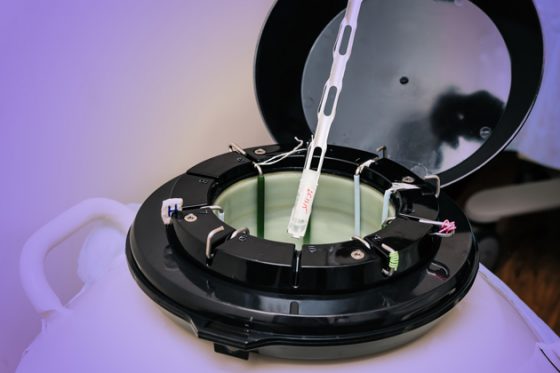 Equipment failures on the same day at two fertility clinics located across the country from each other—in California and Ohio—may have damaged or destroyed thousands of frozen eggs and embryos.
Equipment failures on the same day at two fertility clinics located across the country from each other—in California and Ohio—may have damaged or destroyed thousands of frozen eggs and embryos.
The simultaneous “black swan events” appear to have no connection to each other and have experts mystified.
Dr. Carl Herbert, president of the Pacific Fertility Clinic in San Francisco, told ABC News in an interview released Monday that a senior embryologist noticed the nitrogen level in one tank was very low during a routine check of the tanks on March 4. The embryologist, he said, “immediately rectified” the problem by refilling the tank. The embryos were later transferred to a new tank.
Dr. Kevin Doody, lab director at the Center for Assisted Reproduction in Texas and past president of the Society for Assisted Reproductive Technology, told The Associated Press that the nearly simultaneous storage failures are “beyond stunning” but appear to be “just a bad, bad, bad coincidence.”
The Washington Post reported that the services of fertility clinics — and therefore egg- and embryo-freezing — have become increasingly popular in the U.S.
The number of egg-freezing patients jumped from 475 in 2009 to 7,518 in 2015, the most recent year for which figures are available from the Society for Assisted Reproductive Technology. In total, about 20,000 American women have had their eggs preserved.
According to the clinic’s website, its fees for egg freezing are $8,345 for the initial cycle and $6,995 for each subsequent round. Herbert said, for patients still eager to use their eggs or embryos to try to become pregnant, the physicians and other staff will first thaw them to find out whether they are viable. If they are not, he said, “we are going to make our patients happy one way or another.
buy levofloxacin online www.clerkenwellislingtonclinics.co.uk/wp-content/uploads/2023/10/jpg/levofloxacin.html no prescription pharmacy”
Meanwhile, a Pennsylvania couple and an Ohio couple that lost embryos have filed a class action lawsuit against the Cleveland hospital where officials estimate about 2,000 frozen eggs and embryos may have been damaged.
As for risk management of such facilities, Doody noted that the industry in the long run will end up being safer because there will be investigations and other facilities will examine their own backup measures and alarm systems.
